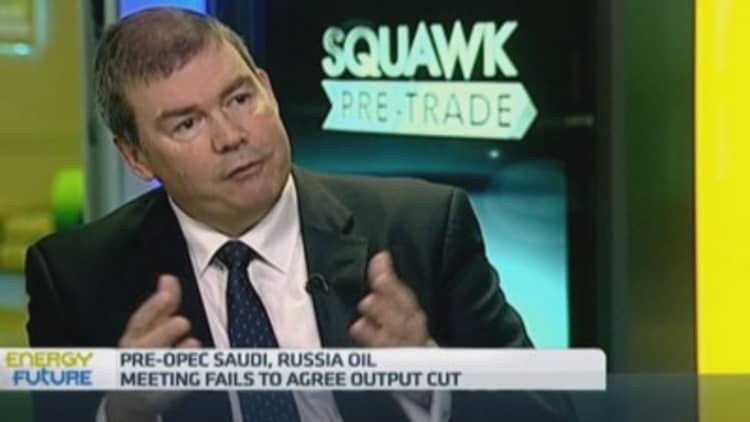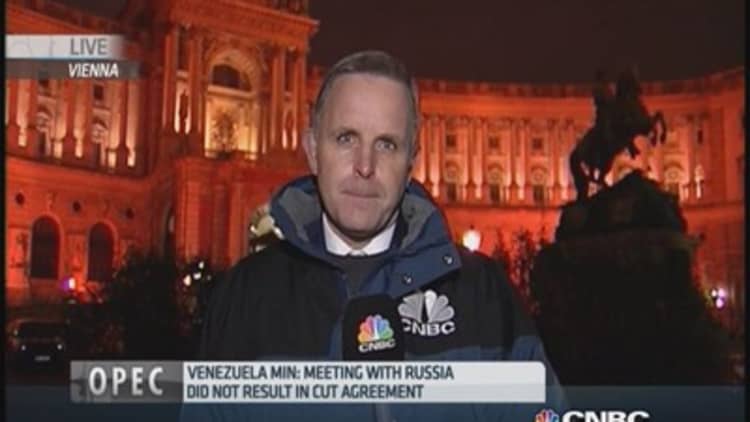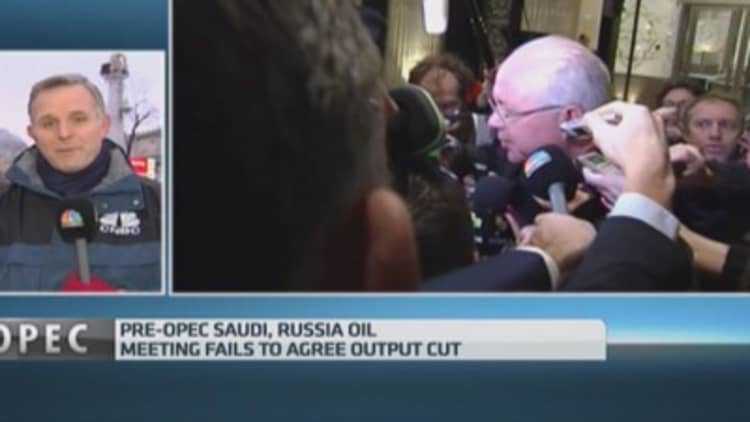


Saudi Arabia will this week push the Organization of Petroleum Exporting Countries (OPEC) to cut production by up to 1.5 million barrels a day to help re-balance the market and lift oil prices from their four-year lows, analysts and strategists told CNBC.
Nineteen out of 30 market professionals contacted by CNBC say OPEC's leading member Saudi Arabia will spearhead an agreement to cut supply at its November 27 meeting.
"Only a 1.5 million barrel-a-day reduction would help stabilize the price at this stage," Ole Sloth Hansen, head of commodity strategy at Saxo Bank, told CNBC.
"If no action is taken the market will see this as a renewed selling opportunity."
Read More Russia revs up oil bears ahead of OPEC meeting
Still, persuading producers outside the Gulf to share the burden of production cuts will prove a tough sell -- even for the Kingdom's seasoned and influential oil minister Ali Al-Naimi.
"The market is now asking the Saudis to show how much control they really do have within OPEC," said Carl Larry, President of Houston-based consultancy Oil Outlooks and Opinions.
Nonetheless, 11 out of 30 strategists polled by CNBC believe OPEC won't take any action this Thursday, possibly deferring a decision to early next year.
"It's hard to imagine any significant cut," said Daniel Yergin, vice-chairman of IHS CERA and the Pulitzer-Prize winning author of 'The Prize: The Epic Quest for Oil, Money, and Power.'
Arab Spring
OPEC, whose members supply the world with 40 percent of its oil, is reported to be besieged by internal rifts and external challenges, raising the prospect that Thursday's meeting could be one of its most fractious in decades.
Its 12 member states are deeply divided - divisions made starker after the upheaval of the Arab Spring four years ago forced many Gulf nations to boost social spending and assume a higher oil price to balance their budgets.
OPEC produced 30.60 million barrels a day in October, according to the International Energy Agency, above its official quota of 30 million barrels and outstripping demand for OPEC's oil – the "call" on OPEC – which is expected to drop to 29.20 million barrels per day in 2015.
"It will be very difficult to reach an agreement, and the situation has for sure not improved after the Arab Spring," said Thina Margrethe Saltvedt, senior macro oil analyst at Nordea Markets in Oslo. "Many OPEC members, such as Iran, Venezuela and Libya, need prices well above $100 a barrel to balance their budgets and they now feel the pressure."
OPEC may frame a compromise deal allowing member states embroiled in civil war or under sanctions pressure to opt out, according to Neil Atkinson, head of analysis at Lloyds List Intelligence.
"Iran is affected by sanctions, Libya has very special problems with civil war raging and two competing governments vying for control and Iraq has always sat outside OPEC production agreements since the US-led invasion in 2003," Atkinson told CNBC. "In this latest agreement, Iraq will not be asked to cut production but it will be asked not to increase it."
Acrimony and quotas
More broadly, the U.S. shale revolution has hit demand for OPEC's oil, leaving the group's members battling for market share -- and to balance their budgets.
Read More Consumer discretionary sector may be messenger about OPEC
Thursday's meeting "may be ugly, lengthy, and acrimonious," said Michael Wittner, global head of oil research at Societe Generale. Nonetheless, the Saudis will ultimately succeed in leading a "meaningful cut" of between 1.0 and 1.5 million barrels a day from current production levels, Wittner said.
SocGen pegs a 60 percent probability under this "base case scenario" and says it could help set the stage for a recovery in Brent and U.S. crude futures to $90 and $82 respectively in 2015.
OPEC may also try to enforce tighter discipline among its members, making sure it sticks to the official 30 million-barrel quota -- implying a token cut of around 500,000 to 600,000 barrels a day.
Still, there's no guarantee member states will necessarily abide by the ruling since OPEC "doesn't have country by country quotas anymore," said John Kingston, Global Director of News at Platts.
Summing up OPEC's dilemma, Ed Morse, global head of commodity research at Citi added: "If the organization reconfirms its 30-million b/d target without reference to who will cut to get there, it would not be credible and would lead to a sell-off in the market."
OPEC would have to take bolder, more material action to stabilize the market, involving a cut in production of more than 500,000 barrels a day "to below the current quota for prices to rally significantly," according to Goldman Sachs strategists Damien Courvalin and Anamaria Pieschacon.
Petro-diplomacy
While OPEC's Secretary-General, Abdullah al-Badri, has stated that he's "concerned but not panicking" by this year's sharp price decline, the group's last-minute diplomatic scramble to engage non-OPEC producers to also participate in production cutbacks represents a tacit acknowledgement that the organization alone no longer has the heft or market share to control the oil market.
Fereidun Fesharaki, chairman of consultancy FACTS Global Energy and a former energy adviser to the Prime Minister of Iran in the 1970s, says OPEC has only waited until now to address crude oil's 30 percent price decline since June is aimed at forcing "collaboration amongst OPEC and non-OPEC countries to cut production."
Read More Oil traders increase bets on OPEC action
Impromptu talks between Saudi Arabia, fellow OPEC member Venezuela and non-member powers Russia and Mexico yielded no agreement on Tuesday on how to address a growing oil glut, ending without any plan to cut output despite a collapse in prices, Reuters reported.
"I would pour the frozen waters of the [Siberian River] Ob on the chances of a Russian production cut," said Robin Mills, Head of Consulting at Manaar Energy in Dubai.
Follow us on Twitter: @CNBCWorld



